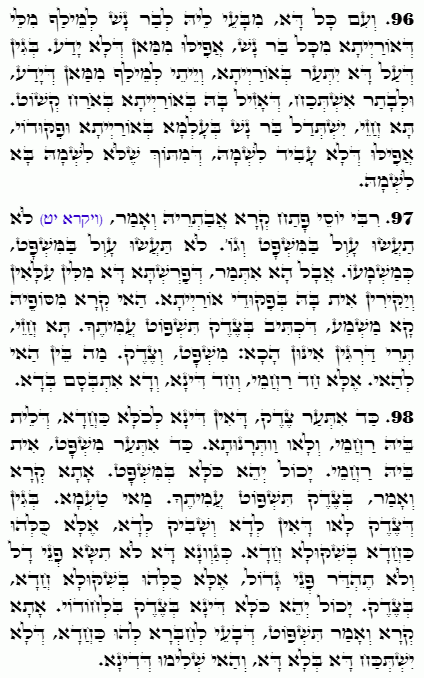Daily Zohar # 4604 – Kedoshim – Judge without bias.
Daily Zohar 4604

Hebrew translation:
97. רַבִּי יוֹסֵי פָּתַח בַּפָּסוּק אַחֲרָיו וְאָמַר, לֹא תַעֲשׂוּ עָוֶל בַּמִּשְׁפָּט וְגוֹ’. לֹא תַעֲשׂוּ עָוֶל בַּמִּשְׁפָּט, כְּמַשְׁמָעוֹ. אֲבָל הֲרֵי נֶאֱמַר, שֶׁבַּפָּרָשָׁה הַזּוֹ יֵשׁ בָּהּ דְּבָרִים עֶלְיוֹנִים וְנִכְבָּדִים בְּמִצְווֹת הַתּוֹרָה. מִסּוֹף הַפָּסוּק הַזֶּה מַשְׁמָע, שֶׁכָּתוּב בְּצֶדֶק תִּשְׁפֹּט עֲמִיתֶךָ. בֹּא רְאֵה, שְׁתֵּי דְרָגוֹת הֵן כָּאן – מִשְׁפָּט וָצֶדֶק. מַה בֵּין זֶה לָזֶה? אֶלָּא אֶחָד רַחֲמִים וְאֶחָד דִּין, וְזֶה מִתְבַּשֵּׂם עִם זֶה.
98. כְּשֶׁמִּתְעוֹרֵר צֶדֶק, הוּא דָּן דִּין אֶת הַכֹּל כְּאֶחָד, שֶׁאֵין בּוֹ רַחֲמִים וְלֹא וַתְּרָנוּת. כְּשֶׁמִּתְעוֹרֵר מִשְׁפָּט, יֵשׁ בּוֹ רַחֲמִים. יָכוֹל יִהְיֶה הַכֹּל בְּמִשְׁפָּט? בָּא הַכָּתוּב וְאוֹמֵר, בְּצֶדֶק תִּשְׁפֹּט עֲמִיתֶךָ. מָה הַטַּעַם? מִשּׁוּם שֶׁצֶּדֶק לֹא דָן אֶת זֶה וְעוֹזֵב אֶת זֶה, אֶלָּא כֻּלָּם כְּאֶחָד בְּמִשְׁקָל אֶחָד. כְּמוֹ כֵן, לֹא תִשָּׂא פְנֵי דָל וְלֹא תֶהְדַּר פְּנֵי גָדוֹל, אֶלָּא כֻּלָּם בְּמִשְׁקָל אֶחָד, בְּצֶדֶק. יָכוֹל יִהְיֶה הַכֹּל בְּצֶדֶק בִּלְבַדּוֹ? בָּא הַכָּתוּב וְאָמַר תִּשְׁפֹּט, שֶׁצָּרִיךְ לְחַבֵּר אוֹתָם כְּאֶחָד שֶׁלֹּא יִמָּצֵא זֶה בְּלִי זֶה, וְזוֹהִי שְׁלֵמוּת הַדִּין.
.
Zohar Kedoshim
Continued from previous DZ
#96
“שֶׁמִּתּוֹךְ שֶׁלֹּא לִשְׁמָהּ בָּא לִשְׁמָהּ”
And with all this, a person must learn Torah from anyone, even from someone who does not know, because by doing so, he will awaken the desire to study more Torah and come to learn from others. And afterward, it will be found that he has walked in the Torah in the path of truth. Come and see, a person should always engage in the Torah and its commandments, even if he does not do so for the sake of studying the Torah (לא לשמה) to reveal its Light because from ‘not for its sake,’ he will come to study for the sake of the Torah (לשמה).
Notes:
The Talmud says (https://www.sefaria.org/Pesachim.50b.5?lang=bi&with=all&lang2=en)
“Rav Yehuda said that Rav said A person should always engage in Torah study and performance of mitzvot, even if he does so not for their own sake, as through the performance of mitzvot not for their own sake, one gains understanding and comes to perform them for their own sake.”
#97
Rabbi Yossi opened with the following verse and said,
Leviticus 19:15
“לֹא תַעֲשׂוּ עָוֶל בַּמִּשְׁפָּט לֹא תִשָּׂא פְנֵי דָל וְלֹא תֶהְדַּר פְּנֵי גָדוֹל בְּצֶדֶק תִּשְׁפֹּט עֲמִיתֶךָ.”
“‘You shall do no injustice in judgment. You shall not be partial to people with low incomes nor honor the person of the mighty. In righteousness, you shall judge your neighbor.”
“You shall do no injustice” is to be understood in its plain meaning. However, we have learned that this portion contains lofty and precious matters regarding the commandments of the Torah. This verse is explained by its conclusion, as it is written, “In righteousness shall you judge your neighbor.”
Come and see, there are two levels here: judgment (מִשְׁפָּט) and righteousness (צֶדֶק). What is the difference between them? One is mercy, which is judgment, referring to Zeir Anpin (male aspect), and the other is justice, which is righteousness, referring to Malchut (female aspect), and this one is sweetened by that one.
#98
When righteousness (צֶדֶק) is aroused, it judges everyone equally, as it contains neither mercy nor leniency. When judgment (מִשְׁפָּט) is aroused, it includes mercy. One might think that everything should be judged solely by judgment, but the verse says, “בְּצֶדֶק תִּשְׁפֹּט עֲמִיתֶךָ” “In righteousness shall you judge your neighbor.” Why is this? Because righteousness does not judge one person and pardon another; it judges everyone equally, without distinction. Similarly, “לֹא תִשָּׂא פְנֵי דָל וְלֹא תֶהְדַּר פְּנֵי גָדוֹל” “You shall not show favoritism to a poor person, nor honor a great person”, but judge everyone equally, in righteousness.
One might think that all judgment should be in righteousness alone, but the verse says, “You shall judge,” indicating that they must be combined. Neither should exist without the other, which is the perfection of judgment.
Lesson;
Judgment (מִשְׁפָּט) relates to Zeir Anpin (associated with mercy), and righteousness (צֶדֶק) relates to Malchut (associated with justice).
Righteousness judges everyone equally without favoritism, reflecting the idea of impartiality in justice.
The principle of not showing favoritism to the poor or the rich and famous emphasizes the importance of impartiality in legal and moral judgments. If a poor person and a rich person are in court and the rich person is dressed ‘higher,’ the judge can order a rich person to dress the poor person like him or dress down like the poor person.
This Zohar teaching emphasizes the importance of understanding both the literal and the deeper meaning of the Torah’s commandments. It underscores the relationship between mercy and justice and the need to balance these attributes in pursuing righteousness, ensuring that all are judged relatively without bias.
{||}

 Previous: Kedoshim
Previous: Kedoshim

